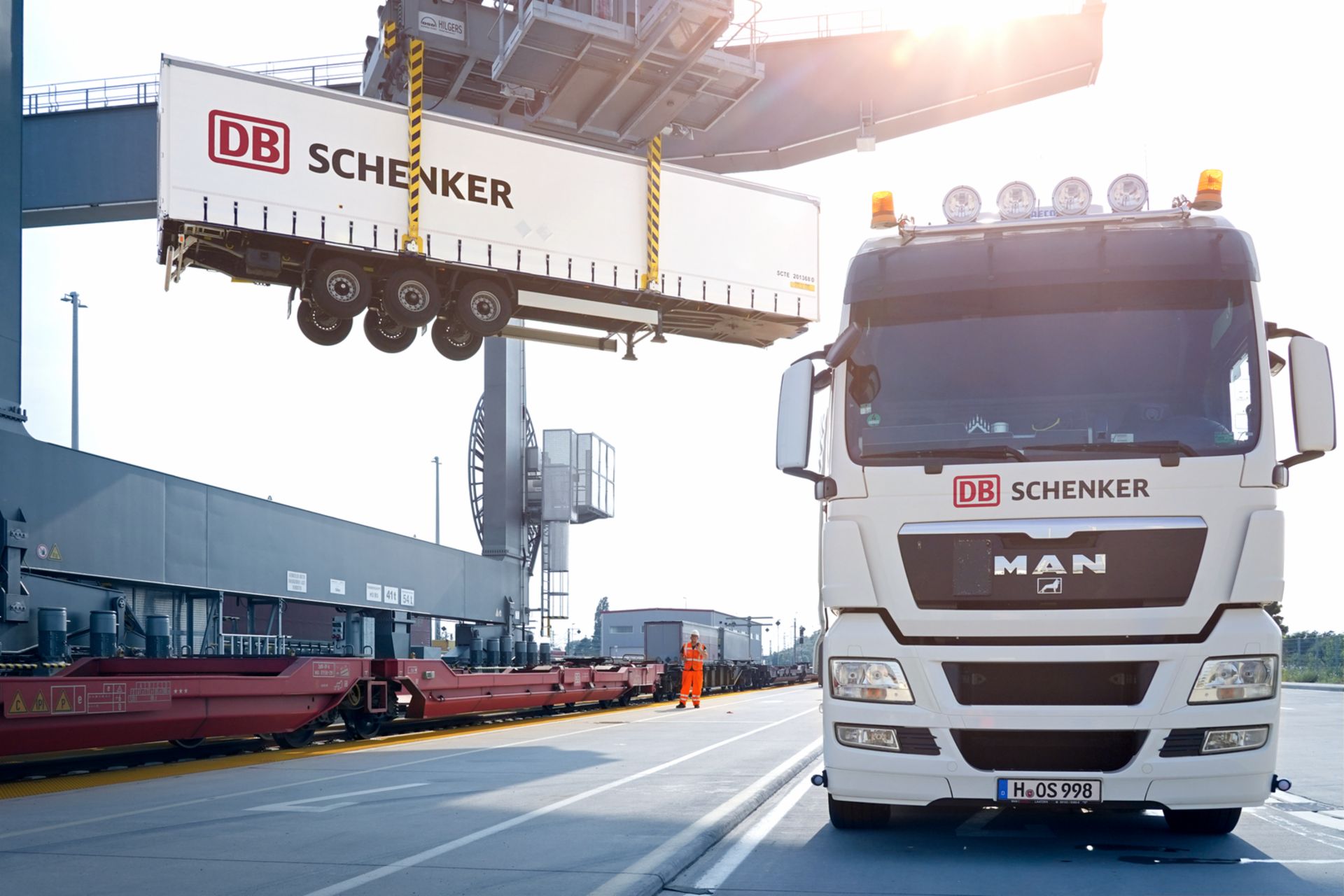“Over the coming years, logistics will face ongoing disruption. Companies must proactively prepare themselves and their customers.”
Erik Wirsing Vice President Global Innovation, DB Schenker
“Over the coming years, the logistics industry will face ongoing disruption. Some of this is due to geopolitical factors, such as the actions of the Trump administration, while the rising frequency of natural disasters plays a role. Cyberattacks are also a growing threat. Companies must proactively prepare themselves and their customers by monitoring the geopolitical situation, developing emergency scenarios, and strengthening supply chains and IT systems.
Besides these risks, digital and autonomous technologies offer immense opportunities. The number of applications for artificial intelligence will increase. AI already supports us in optimizing routes, calculating carbon footprints, optimizing prices, and many other fields. Due to demographic-driven skills shortages, humanoid robots are likely to become more common in the future.
As far as autonomous mobility is concerned, we will see rapid advances, also due to improvements in AI. Towards the end of the decade, we will see autonomous heavy-duty transport in Germany – most likely on the Autobahn.
Even as AI and robots become increasingly important, the logistics sector will remain a major employer. Upskilling the workforce for new roles after robots take over simple tasks is a crucial challenge and responsibility.
Sustainability remains a key game changer – not just due to new regulations, but also because our customers increasingly demand lower-emission solutions. At DB Schenker, we are committed to a sustainable future, investing in innovative transport solutions, renewable energy, and CO2-saving products for our customers.”
“The electrification of the transportation industry is not merely a change – it is a revolution that will redefine the competitive landscape.”
Anja van Niersen CEO, Milence
“Transportation is the backbone of the global economy. Its importance will only continue to grow. The digitalization of society, coupled with the rapid advancement of the e-commerce industry, means logistics systems will expand in scale and complexity further.
As it goes hand in hand with digital integration, the electrification of the transportation industry is not merely a change – it is a revolution that will redefine the competitive landscape. Truck manufacturers cannot view it as 'just another propulsion or fuel technology' but instead must embrace it as a redesign of the entire system.
Digital ecosystems, where vehicles, infrastructure, and logistics planning systems are seamlessly interconnected, are set to enable smoother and more efficient logistics. The increasing use of real-time data and analytics in particular offers significant opportunities. On an economic scale, digitalization and electrification will reduce transport costs and emissions. Cost and complexity make them challenging for smaller companies to adopt though, likely leading to further consolidation.
Other significant challenges also remain: power grids require upgrades and the higher upfront costs of vehicles and megawatt charging hubs will require close coordination between governments and private operators. Markets that embrace innovations nevertheless will stand out and excel. Within logistics, those who embrace megawatt charging technology will set the tone and accelerate the transition towards zero-emission logistics fast.
Widespread adoption of autonomous trucks will require multiple development cycles and an additional decade for older trucks to phase out. However, this timeline could accelerate if a worsening driver shortage puts pressure on the industry.
The development of autonomous transport will progress at varying speeds globally. Europe is likely to lag behind due to its strong emphasis on consensus and because its diverse road systems are less suited to automation than those in the USA and China.”
“Across the world, the pandemic has made us realize that globalization its perils. In the coming years, we will likely see a reduction in globalization.”
Prof. Dr. Andreas Knie Head of the Research Group “Digital Mobility and Social Differentiation”, WZB
“Across the world, the pandemic has made us realize that globalization has its perils. In the coming years, we will likely see a reduction in globalization. Supply chains will become more compact. 'From the region, for the region' will be a common operative phrase. We will also see major innovation within the last mile, the most costly phase of logistics.
Air and sea traffic will continue to shrink, while the importance of rail will decrease significantly. This is the era of the truck, though not for the same long distances. More importantly, trucks will be increasingly electric. Today, modern batteries are more powerful than many predicted a couple of years ago. This is why hydrogen and e-fuels will not play the significant roles once predicted.
Automated systems will play a larger role in trucks, new driver assistance systems will increase safety and comfort. However, logistics will not become entirely driverless in the coming years. The driver shortage is not large enough to warrant that.
All in all, transport will not only become more fragmented and regional, but also more expensive. Price competition around the best logistics concepts has its limits.”
WZB stands for the Berlin Social Science Center
(Image Copyright: Bernhard Ludewig)
“The automotive value chain requires logistics partners capable of supporting new facilities such as gigafactories and charging station networks.”
Fathi Tlatli President of the Global Auto-Mobility Sector, DHL
“Our relationship with mobility is changing as the adoption of electric vehicles and sustainable solutions increases. The way in which consumers and companies perceive, acquire, and utilize vehicles will all be strongly impacted. The year 2026 could be the start of an inflexion point for sustained growth for electric mobility in Europe. After that, we expect uptake of electric vehicles to accelerate further, starting with passenger cars and moving to trucks a little later.
In addition to the charging infrastructure this requires, sustainable solutions for handling and recycling used and damaged batteries are crucial. The automotive value chain requires logistics partners capable of supporting new facilities such as gigafactories and charging station networks.
In terms of our own operations, we are adopting electrification and digitalization approaches, particularly when it comes to decarbonizing the supply chain. By integrating over 36,000 electric vehicles into our fleet, we can reduce our carbon footprint and operational costs over time, aligning with our commitment to sustainability.
Digitalization also plays a crucial role in optimizing our processes. Implementing IoT devices and AI-driven analytics will enable us to monitor vehicle performance in real-time, facilitating predictive maintenance and minimizing downtime. Enhanced data analytics will help us optimize routing and load management, leading to a more efficient use of our resources and improved delivery timelines.
Autonomous driving could become a real game changer in logistics: when it comes to trucks, it not only means an optimization of the driver’s output – at the same time, safety and resource management could be increased further. In the coming years, we expect to see technology develop – both when it comes to the vehicles themselves, as well as the infrastructure needed to support them. This will occur alongside the advancement of regulatory frameworks. DHL Group is dedicated to fulfilling its part and helping to shape the logistics of tomorrow.”
“Digitalization will bring sweeping change to the logistics industry. Platform economics, data-driven business models, and artificial intelligence unlock entirely new possibilities.”
Prof. Dr. Alexander Pflaum Director Center for Applied Research on Supply Chain Services, Fraunhofer IIS
“Digitalization will bring sweeping change to the logistics industry over the next five years and beyond. Platform economics, data-driven business models, and artificial intelligence unlock new possibilities: supply chains can be tracked, inspected, and optimized in real time, while IoT and digital platforms integrate goods directly into companies’ IT systems. Intelligent vehicles and containers will transport smart packages equipped with RFID technology. We will see an entirely new market created. Many companies have already begun tapping into it, even if they are only just scratching the surface.
Supply chain management can benefit most from innovative data analysis. Machine learning algorithms can recognize trends and make precise predictions but also identify risks – leading to supply chains becoming more resilient. This resilience is vitally important in these geopolitically and ecologically challenging times. Furthermore, the transformation from traditional 'take-make-waste' supply chains to circular systems could mean a quantum leap in resiliency. Today’s products will then become the raw materials for tomorrow’s production – and companies will be less reliant on foreign suppliers for resources.
Data will also have an enormous impact on the autonomous mobility of goods and people. Businesses from the automotive, digital, and communications sectors must jointly develop the ecosystems needed for an autonomous future. This will create a market of considerable size.
Despite the megatrend of digitalization, we expect supply chains to become increasingly localized. Global companies champion the idea 'local for local'. Production of products, such as vehicles, will increasingly take place in proximity to the customer. This will inevitably impact the global flow of goods. Only time will tell how its structure and volume will change.”
(Image copyright: Fraunhofer IIS)
“Three huge trends will shape the future of logistics: autonomy, electrification, and digitalization. Among these, electrification will have the greatest impact over the next five years.”
Dr. Atif Askar Head of Business Development, Strategy and M&A, TRATON GROUP
“Three huge trends will shape the future of the logistics industry: autonomy, electrification, and digitalization. Among these, electrification will have the greatest impact over the next five years. The technology has advanced much further than was predicted just a few years ago – and battery prices are also falling faster than expected. The financial case for electrified fleets is therefore becoming increasingly compelling. Consequently, global logistics will be predominantly electric in the medium term.
Beyond developing electric trucks, rapidly expanding charging infrastructure quickly is our top priority. At TRATON, we do this through Milence, our joint venture for public charging, while also providing the supporting ecosystem.
This is where the second trend emerges: digitalization. Logistics companies using electric trucks need a digital management system to track vehicle locations, monitor charging status, and identify available charging points. Electrification and digitalization go hand in hand.
In general, long haul is the most difficult segment to electrify. However, as energy costs dominate and margin pressure is high, it is also the most worthwhile.
The third trend, autonomous mobility, will also expand, though on a much longer timeline. In any case, autonomous mobility will primarily take shape with electrified and digitalized trucks operating over long distances.
Electric heavy-duty transport is not just cheaper in the medium term – it also enables enormous reductions in CO2. In relation to the cost of building charging infrastructure, the impact is massive.
That is another reason why electrification is a top priority for the coming years at TRATON. We remain committed to providing practical and tailored solutions for our customers – from truck financing to charging and maintenance.”









